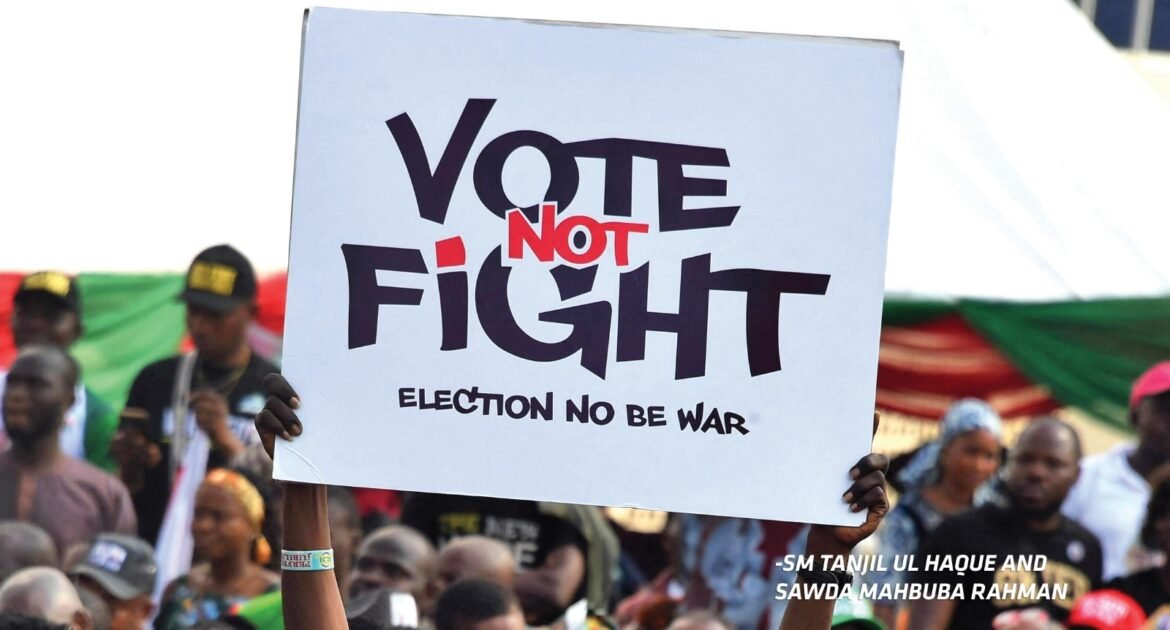The debate over interim government during the forthcoming 12th national parliamentary elections in Bangladesh has sparked interest in examining the electoral processes of other countries. Many nations across the globe conduct transparent, equitable elections without the need for interim governments ensuring continuity and stability, SM TANJIL UL HAQUE delve deep into the details
As Bangladesh’s 12th national parliamentary elections approaching, the opposition party, Bangladesh Nationalist Party (BNP), has called for an interim government to oversee the election process. However, the ruling party, Awami League, has opposed this demand, stating that it is unnecessary or not beneficial, and would disrupt the democratic process in the country. While this debate continues, it is worth noting that many countries around the world hold fair and transparent elections without the need for a caretaker government. To shed light on the matter, a closer examination of the election processes of ten countries, including the United States, United Kingdom, China, Malaysia, Japan, Germany, France, India, Pakistan, and Indonesia, reveals that many of them do not have interim governments and still conduct fair and transparent elections.
You can also read: Bloomberg forecasts PM Sheikh Hasina’s fourth consecutive term
UNITED STATES
Federal and state governments are both involved in the national election system in the United States (US). Candidates usually announce their plans to run for president one year before to the election. Thousands of administrators help local authorities organise elections because there is no central body in charge of overseeing voting. The 538 members of the Electoral College are responsible for casting votes for president of the United States. Except for the District of Columbia, which is given three electors, each state is given an equal number of electors to the number of its Senators (always two) and Representatives in the House of Representatives. The candidate who receives a majority of electoral votes (at least 270) is elected President of the US.
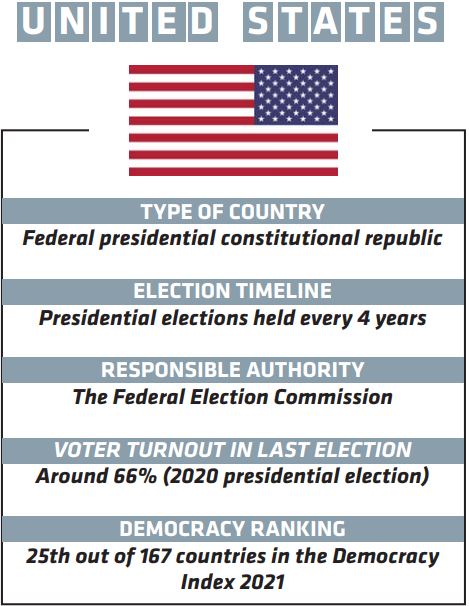
The process begins with the primary elections, in which registered voters in each state choose their favourite candidate from their respective political parties. The winners of the primaries then compete in the general election, which is held on the first Tuesday of November in every presidential election year. The supervision of polling places, ballot design, and voter registration are all responsibilities of the state. They also have their own deadlines and guidelines for early and absentee voting. The federal government has a responsibility to defend voting rights and ensure that elections are fair and secure.
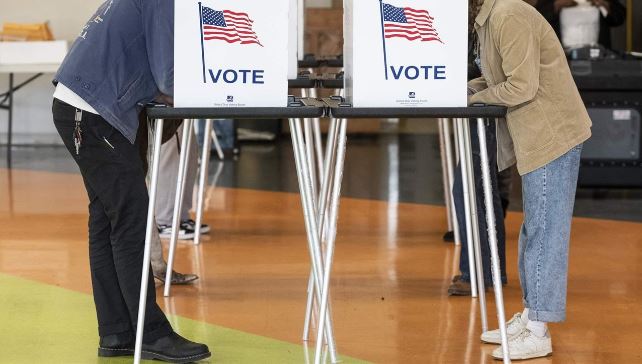
According to the democracy Index -2021 of “The Economist Intelligence Unit”, United States has a score of 7.85 out of 10 and ranks 26 out of 167 nations. This is a vital part of American democracy and attracts international attention. The US does not have a caretaker government since the Constitution does not provide for such a structure. Instead, the outgoing president continues in office until the inauguration of the newly elected president on January 20 of the following year. During this period, the outgoing president is considered to as a “lame duck” and has limited authority to make significant policy choices. This mechanism is intended to facilitate a seamless transfer of power between presidents.
UNITED KINGDOM
The election process in the United Kingdom is vital to its democratic system. The national election process in the UK is a parliamentary system in which people elect representatives to the House of Commons. The political party with the most members of parliament forms the government, and its leader becomes the Prime Minister. Generally, general elections are held every five years in the United Kingdom, although the Prime Minister or Parliament may call them earlier. Using a method known as First-Past-The-Post, voters select a single candidate to represent them within their constituency. In the United Kingdom, there are 650 constituencies, each with a comparable number of eligible voters. Candidates may run for office on behalf of political parties or as independents. There is no directly elected head of state in the United Kingdom, as the monarch’s role is mostly ceremonial. Typically, before an election is held, political parties conduct a campaign period where Candidates debate and interact with voters during the campaign to gain support. The government is formed by the party with the largest number of seats, whose leader becomes the Prime Minister. Parties may form a coalition government if no party wins a majority in an election.
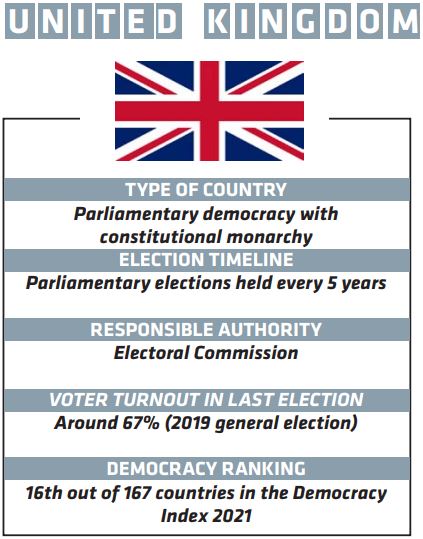
According to the democracy Index -2021 of “The Economist Intelligence Unit”, UK has a score of 8.10 out of 10 and ranks 18 out of 167 nations. The Electoral Commission oversees the election process in the United Kingdom and ensures that elections are free and fair. Furthermore, political parties are subject to stringent regulations regarding the use of funds and publicity surrounding election campaigns. Moreover, the parliamentary system in the United Kingdom allows for a new government to be formed rapidly after an election. The outgoing administration remains in power until a new one is established, and the prime minister continues to hold office until a successor is nominated. This promotes continuity in government and prevents a power hoover or period of uncertainty during the transition between governments.
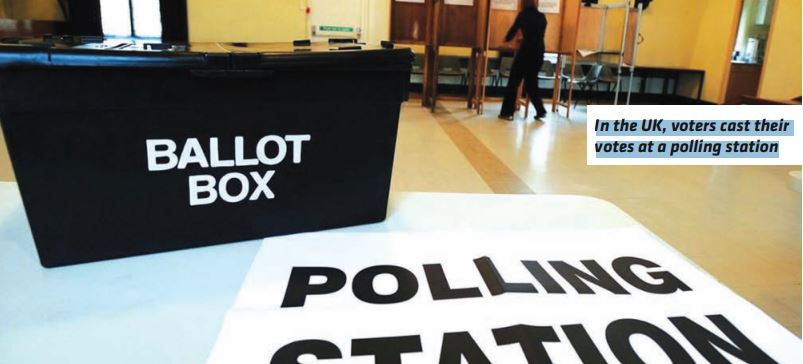
CHINA
China’s national election process differs from those of many other nations since the Chinese Communist Party (CCP) is the sole legitimate political party. When mentioning the Chinese Communist Party, the name of Xi Jinping, president of China for the third time in a row, naturally comes up.
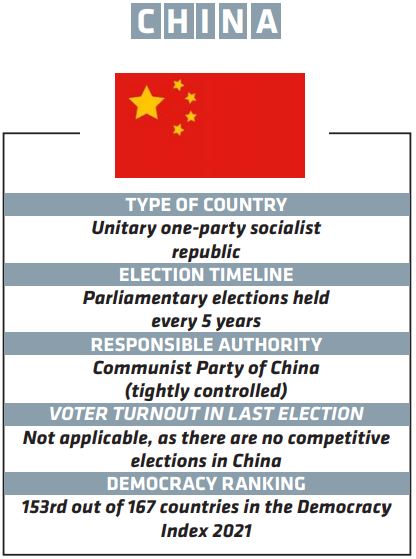
The electoral process in China involves a system of Party Congresses at the local, provincial, and national levels. The responsibility of these Congresses is to pick candidates for the next level of Congress, and ultimately the NPC. Candidate approval by the Communist Party of China (CPC) is a crucial step for seeking office in China. Independent candidates and parties are not permitted in the electoral process. The National People’s Congress (NPC) is the highest legislative body in China and is responsible for choosing the President and other senior officials. The NPC elects the President of China for a five-year term, but he or she may remain in power indefinitely.
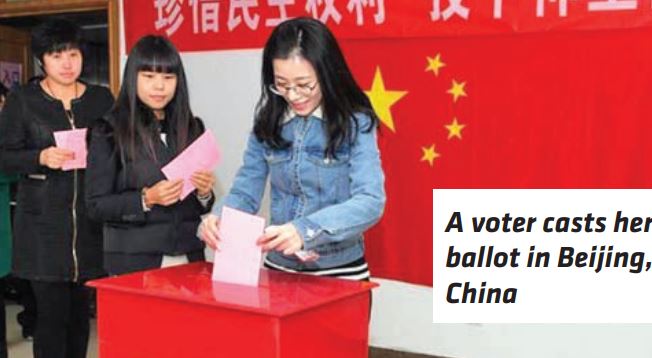
Generally, the CCP firmly controls the electoral process in China, and political opposition is not tolerated. Given the limitations of the electoral process, the NPC plays a vital role in China’s political system and is responsible for making crucial decisions such as the nomination of the President and Premier. In China’s one-party system, however, the CPC has ultimate authority and the NPC is ultimately subordinate to it. According to the democracy Index -2021 of “The Economist Intelligence Unit”, China has a score of 2.21 out of 10 and ranks 148 out of 167 nations. Under China’s political system, power is concentrated in the hands of the CPC and its leadership. During periods of leadership transition or election, the CPC ensures a cohesive transfer of power by carefully managing the succession process. The departing leader collaborates with the new leader to ensure a seamless transition and policy continuity. Under China’s political system, the party exercises control over the government’s decision-making process.
MALAYSIA
Malaysia’s national election is a federal constitutional monarchy with a parliamentary system, in which voters elect members of Parliament (MPs) to represent them in the Dewan Rakyat (House of Representatives). The government is formed by the political party with the most members in parliament, whose leader becomes the Prime Minister. Generally, general elections in Malaysia are conducted every five years, although the Prime Minister or the Yang di-Pertuan Agong (King) on the suggestion of the Prime Minister might call them earlier. Voting is conducted using the First-Past-The-Post system, in which voters choose one candidate from their constituency to represent them.
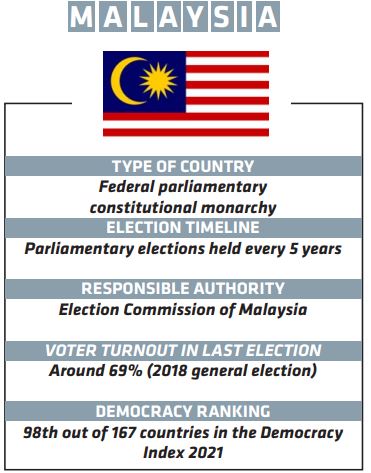
The election process begins when the ruling government dissolves the legislature or state assembly. The Election Commission then determines the election date. Before an election is held, political parties will often conduct a campaign to garner voter support. Throughout the campaign phase, candidates will engage in debates and interactions with voters in an effort to garner their support. Elections in Malaysia are monitored by an independent agency known as the Election Commission, which ensures that they are free and fair. Political parties must also adhere to stringent advertising and campaign fundraising regulations.
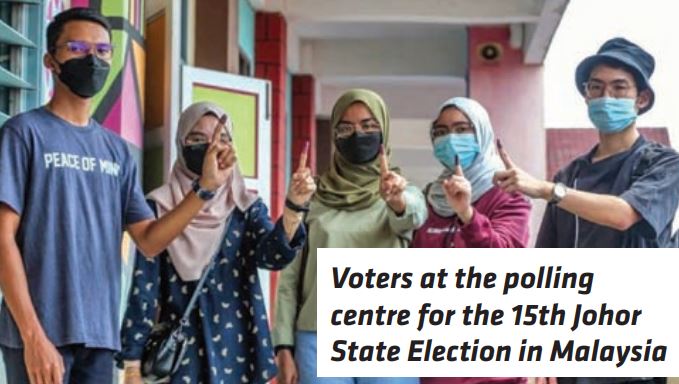
According to the democracy Index -2021 of “The Economist Intelligence Unit”, Malaysia has a score of 7.24 out of 10 and ranks 39 out of 167 nations. The current administration remains in power until a new administration is constituted after the election. During this period, the administration is supposed to continue carrying out its duties and obligations without making major policy decisions or appointments that could influence the outcome of the election. The election process in Malaysia is an integral aspect of the country’s democratic system and is closely observed by citizens and observers across the world.
JAPAN
Japan has a parliamentary system, with elections held every four years for the House of Representatives, the lower house of the National Diet. The upper chamber, the House of Councillors, is likewise elected, although its members serve six-year terms and are not all elected simultaneously.
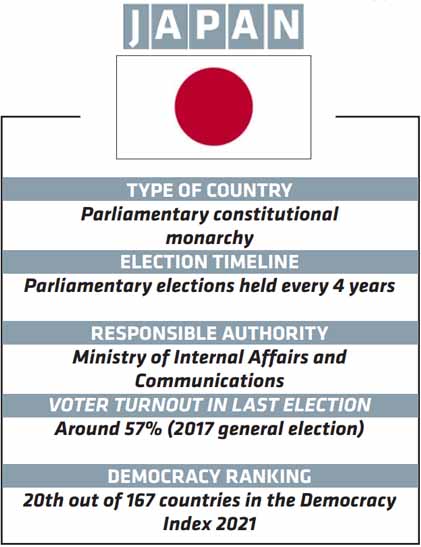
Combining first-past-the-post voting and proportional representation, Japan has a mixed-member proportional representation system. Voters cast two ballots, one for a single-member constituency candidate and the other for a political party. The number of seats a party receives in the House of Representatives is determined by a sophisticated formula based on its vote share. The government is then formed by the party with the most seats in the House of Representatives, whose leader becomes the prime minister. The emperor of Japan appoints the prime minister, who is responsible for forming a cabinet. The Ministry of Internal Affairs and Communications, an independent authority, oversees the election process in Japan and assures that elections are free and fair. Additionally, the ministry oversees voter registration and vote counting. The country’s political system is designed to ensure continuity and stability in government. The existing government remains in power until a new government is formed following an election. The outgoing government is expected to continue carrying out its duties and responsibilities during the election period, while refraining from making major policy decisions or appointments that could affect the outcome of the election. Strong democratic institutions and processes have been attributed in part to the nation’s political stability and economic success. According to the democracy Index -2021 of “The Economist Intelligence Unit”, Japan has a score of 8.15 out of 10 and ranks 17 out of 167 nations.
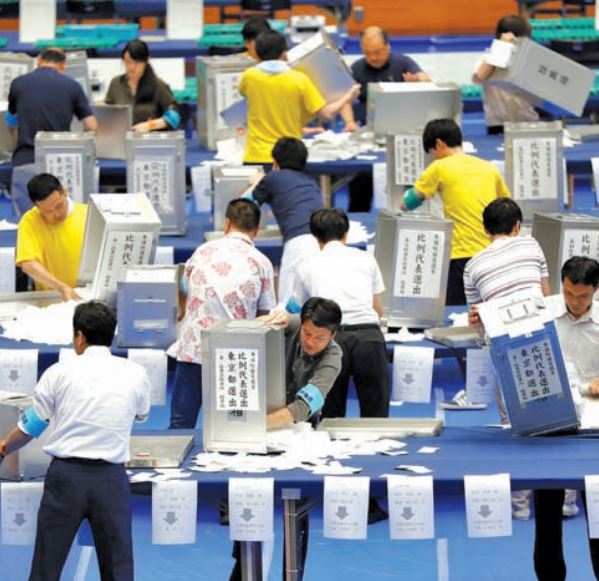
GERMANY
Germany has never had an interim government during its election process since the end of World War II. In fact, the country has a long history of democratic elections, which are conducted every four years, and the Federal Returning Officer is responsible for ensuring that the process is conducted in a transparent and fair manner.

Germany’s electoral system is based on proportional representation, which means that each political party receives a number of seats in the parliament based on the percentage of votes they receive. This system has ensured that smaller parties have a voice in the parliament, which has contributed to the country’s stable and robust democracy. According to the International Institute for Democracy and Electoral Assistance, Germany’s election process is ranked as one of the most transparent and fair in the world. In the 2017 federal election, voter turnout was around 76.2%, which was an increase from the previous election in 2013. The country also has strict campaign finance laws, which limit the amount of money that political parties can spend during the election campaign. Moreover, Germany has been consistently ranked highly in the Democracy Index by the Economist Intelligence Unit, which measures the state of democracy in 167 countries around the world. In the 2021 index, Germany was ranked 15th, with a score of 8.67 out of 10, indicating a robust and functioning democracy.
Germany’s election process is a model for other countries around the world, as it is conducted in a transparent and fair manner without the need for an interim government. The country’s democratic system and strict campaign finance laws ensure that the election process is free from interference and corruption, resulting in a stable and functioning democracy.
FRANCE
In France, the President is elected directly by the people, and the election is overseen by the Constitutional Council. There is no interim government during the election process, and the process is considered to be fair and transparent. However, caretaker governments are appointed to ensure the continuity of the state’s affairs after presidential elections.

The caretaker government’s role is to ensure the smooth functioning of the government until the new president takes office. The election process in France is conducted using a two-round system, where the top two candidates from the first round go on to compete in the second round. Parliamentary elections in France are conducted using proportional representation. While the election process is generally considered to be transparent, political campaign financing in France is not transparent. Despite these challenges, France’s democracy remains strong and resilient, with a well-established electoral system that has ensured the peaceful transfer of power. According to the Democracy Index 2021, France ranked 22nd out of 167 countries, with a score of 7.99 out of 10. The country’s citizens continue to actively participate in the political process, demonstrating a commitment to democratic values and principles.

INDIA
India’s election process is overseen by the Election Commission of India, which is an independent body that ensures that the election is conducted fairly and transparently. There is no interim government in India during the election process, and the country’s democratic system ensures that the election is conducted in a free and fair manner. In India’s history, there have been instances where interim governments have been appointed during elections, but they have been met with criticism and controversy. One such example is the appointment of an interim government during the 1996 general elections, which was headed by H. D. Deve Gowda. The appointment of the interim government was criticised for its potential to influence the election outcome, and for the lack of transparency and accountability in the process. Additionally, the use of money and muscle power in Indian elections has been a long-standing concern, with the potential to undermine the fairness and integrity of the electoral process. Despite these challenges, India’s democratic system has ensured the peaceful transfer of power and a vibrant political culture.
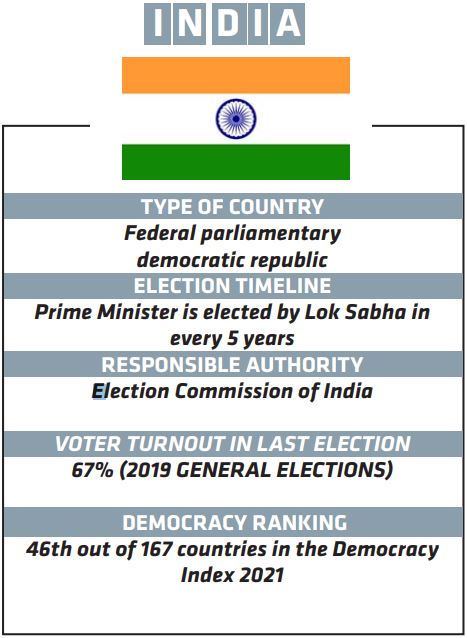
The country’s electoral process is considered to be one of the largest and most complex in the world, with over 900 million eligible voters and multiple phases of voting held over a period of several weeks. In the 2019 general elections, Prime Minister Narendra Modi’s party, the Bharatiya Janata Party (BJP), won a majority of seats in the Lok Sabha, the lower house of Parliament, with 303 out of 543 seats. The voter turnout for the elections was around 67%, with over 600 million people casting their votes. According to the Democracy Index 2021, India ranked 46th out of 167 countries, with a score of 6.91 out of 10. While India’s democratic system has been tested by challenges, it remains a vibrant and robust democracy that values citizen participation and engagement in the political process.
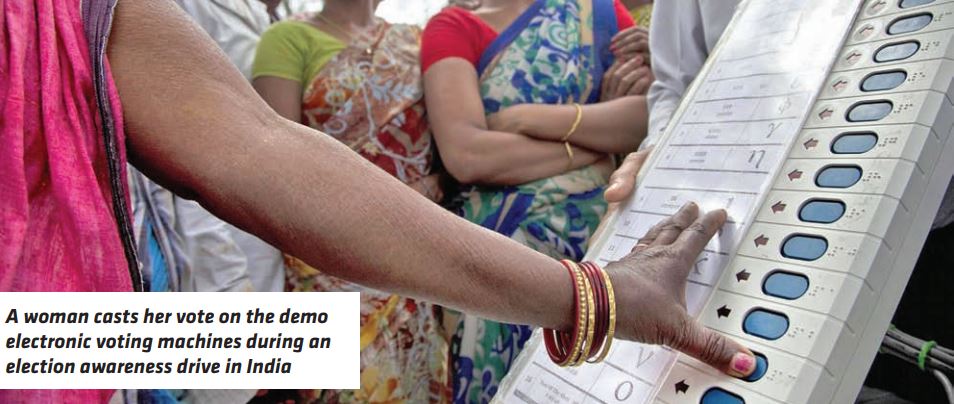
PAKISTAN
Pakistan’s election process is overseen by the Election Commission of Pakistan, which is an independent body that ensures that the election is conducted fairly and transparently. There is no interim government in Pakistan during the election process, and the country’s democratic system ensures that the election is conducted in a free and fair manner. However, Pakistan has a history of interim governments being appointed during the election process, which has been met with controversy and criticism. For instance, in the 2013 general elections, an interim government was appointed to oversee the election process, which was headed by Mir Hazar Khan Khoso. However, the appointment of an interim government was met with allegations of bias and lack of transparency, with several reports of pre-poll rigging and electoral irregularities. Furthermore, the electoral process has been marred by the use of violence and intimidation, with reports of attacks on political candidates and party workers during election campaigns.

The country has a parliamentary system of government, with the National Assembly as the lower house and the Senate as the upper house of Parliament. The Prime Minister is elected by the members of the National Assembly, while the President is elected by an electoral process consisting of members of both houses of Parliament and the provincial assemblies. In the 2018 general elections, the Pakistan Tehreek-e-Insaf (PTI) party, led by Prime Minister Imran Khan, emerged as the largest party in the National Assembly, with 116 out of 272 seats. The voter turnout for the elections was around 55%, with over 105 million registered voters. According to the Democracy Index 2021, Pakistan ranked 104th out of 167 countries, with a score of 4.31 out of 10.
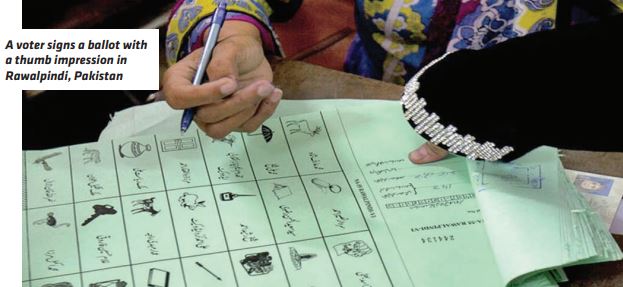
INDONESIA
Indonesia’s election process is overseen by the General Election Commission, which is an independent body that ensures that the election is conducted fairly and transparently. There is no interim government in Indonesia during the election process, and the country’s democratic system ensures that the election is conducted in a free and fair manner.

Indonesia, the fourth most populous country in the world, has a presidential system of government with the President serving as the head of state and government. The country has experienced democratic elections since the fall of the authoritarian regime in 1998. The General Election Commission of Indonesia (KPU) is responsible for organising and overseeing elections in the country. In 2019, Indonesia held its first simultaneous presidential and legislative elections, with over 190 million voters casting their ballots. The elections were praised for their fairness and transparency, and the voter turnout was around 80%. The KPU implemented various measures to ensure the integrity of the election process, such as voter education campaigns and the use of electronic voting machines. According to the Democracy Index 2021 published by the Economist Intelligence Unit, Indonesia is classified as a flawed democracy, with a score of 6.71 out of 10. The index ranks countries based on their electoral process, civil liberties, functioning of government, political participation, and political culture. Indonesia’s score reflects some weaknesses in its democratic institutions, such as corruption, weak rule of law, and restrictions on freedom of speech and press. However, the country has made significant progress in strengthening its democratic system over the past two decades by conducting elections under the ruling government and has seen improvements in areas such as electoral participation and civil society participation.

While these countries do not have interim governments during their election process, they do have independent bodies that oversee the election and ensure that it is conducted fairly and transparently. Interim governments can create political instability and uncertainty, which can negatively impact a country’s economy and social fabric. Therefore, having an independent body to oversee the election process is a better alternative to an interim government.
To conclude, as the upcoming parliamentary elections approaching in the country, it is important to consider the election process in other countries that do not have interim governments. The countries mentioned above have shown that fair and transparent elections can be conducted without the need for an interim government. It is essential that Bangladesh’s election process is conducted in a free, fair, and transparent manner, with independent oversight to ensure a smooth and peaceful transition of power. Moreover, the Election Commission of Bangladesh needs to be resilient and active in monitoring the election process to ensure the participation of all candidates and voters. Goodwill and cooperation from all political parties are also necessary to conduct a successful election process.

Caretaker Government & Controversies of 1/11 saga
- Extension of the Caretaker Government: One of the most controversial issues during the caretaker government was the extension of its tenure. In 2006, the caretaker government led by President Iajuddin Ahmed extended its tenure for three months, citing the need to ensure a smooth transition of power. However, this decision was met with protests and criticism from political parties and civil society groups, who argued that it was a violation of the constitution. As chief adviser he took some controversial and unilateral decisions which resulted in resignation of his four out of ten advisers (ministers).
- 9 December 2007 he deployed the armed forces to handle a political demonstration disregarding objections by his council of advisers.
- Political Interference: During the caretaker government, there were allegations of political interference in the election process. In 2007, the military-backed caretaker government led by Fakhruddin Ahmed was accused of using state institutions to influence the election in favor of certain political parties. This led to protests and criticism from the opposition parties and civil society groups.
- False claims and arrests of politicians: The caretaker government arrested and detained many prominent politicians, including former Prime Ministers Sheikh Hasina and Khaleda Zia, on false charges of corruption and other offenses. Many of these arrests were seen as politically motivated and lacked due process.
- Corruption and Mismanagement: There were also allegations of corruption and mismanagement during the caretaker government. In 2007, the caretaker government led by Fakhruddin Ahmed was accused of mismanaging the economy and failing to control inflation. There were also allegations of corruption in the procurement of goods and services for the election process.
- Suppression of Free Speech: There were also concerns over the suppression of free speech during the caretaker government. In 2007, the government imposed restrictions on the media and arrested journalists who were critical of the government. This led to protests and criticism from civil society groups and the international community.
- Harassment & Violation of Rights: Dhaka University students and teachers assaulted during a football match by armed forces personnel. Mass student protest breaks out in DU campus. Police and other law enforcement officials launched further assault on protesting students injuring dozens. Announcement of curfew after 8 pm in all divisional cities created mass harassment of citizens curving freedom of movement and mass panic. Over 700 cases were launched against students.
- Lack of Accountability: The caretaker government was also criticized for its lack of accountability. In 2008, the military-backed caretaker government led by Fakhruddin Ahmed was accused of violating human rights and suppressing political opposition. However, no one was held accountable for these violations, which led to criticism from civil society groups and the international community.
During a Press Xpress discussion, Nafiul Hasan Limon, who is a faculty member at London College of Legal Studies (LCLS) North, expressed his views on the legality of the caretaker government issue:
Does caretaker government have any legal standing in Bangladesh?
The concept of caretaker government was introduced in 1996 through the 13th Amendment to the Constitution by a controversially elected parliament. Since then, the system of non-party caretaker government has seen the holding of three successful parliamentary elections in 1996, 2001, and 2008. The caretaker government system was heavily disrupted during the aftermath of the 1/11 saga in 2007.
In a landmark ruling issued on 2011, the Supreme Court declared the 13th Amendment of 1996, which introduced the Caretaker Government, to be prospectively null and unconstitutional. The decision did not apply retroactively to invalidate previous elections held under the Care taker Government. In his ruling, the then-chief justice, ABM Khairul Haque, noted that Article 55(3) of the constitution holds the prime minister and the cabinet accountable to the parliament. It has a democratic nature. However, the thirteenth amendment amended this by making the caretaker administration accountable to the president. Article 48 stipulates that the president must seek the prime minister’s counsel. His countersignature is required to declare a state of emergency. However, this clause was useless during the interim government. In this manner, the role of the people has been eliminated, which is antithetical to democracy. There is also the danger of the president becoming despotic.
In addition, he stressed in his ruling that the defence provision of the constitution is delegated to the executive, who are the people’s representatives. During a caretaker government, however, the president assumes responsibility for the ministry of defence despite not being an elected official. Hence, carrying out this executive task is contrary to the fundamental intent of the Constitution. (Paragraph 960) While the legislature is not in session, the president promulgates the ordinance after cabinet approval. During a caretaker government, however, the ordinance is adopted by advisers who were not elected by the people. The aforementioned amendment actually damaged the republican and democratic nature of the state. If the president adopts the position of chief adviser as an additional responsibility under Article 58C (6), he will be an autocrat.
According to Articles 56(4), 57(3), 72(3), 72(4), and 123(3) of the Constitution, the prime minister and cabinet will remain in office upon the dissolution of parliament until a new parliament is elected. As a result, people’s participation will continue without interruption. The court also requested that the Parliament make constitutional amendments to ensure that former Chief Justices or other Supreme Court judges are not appointed to lead caretaker governments.
NAFIUL HASAN LIMON
Lecturer & Faculty Member
London College of Legal Studies (LCLS) North


